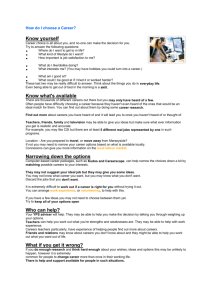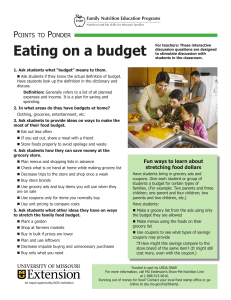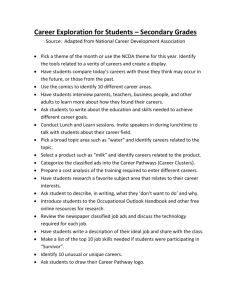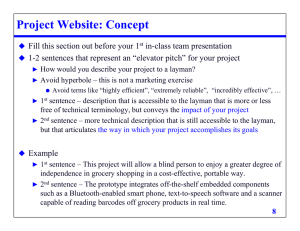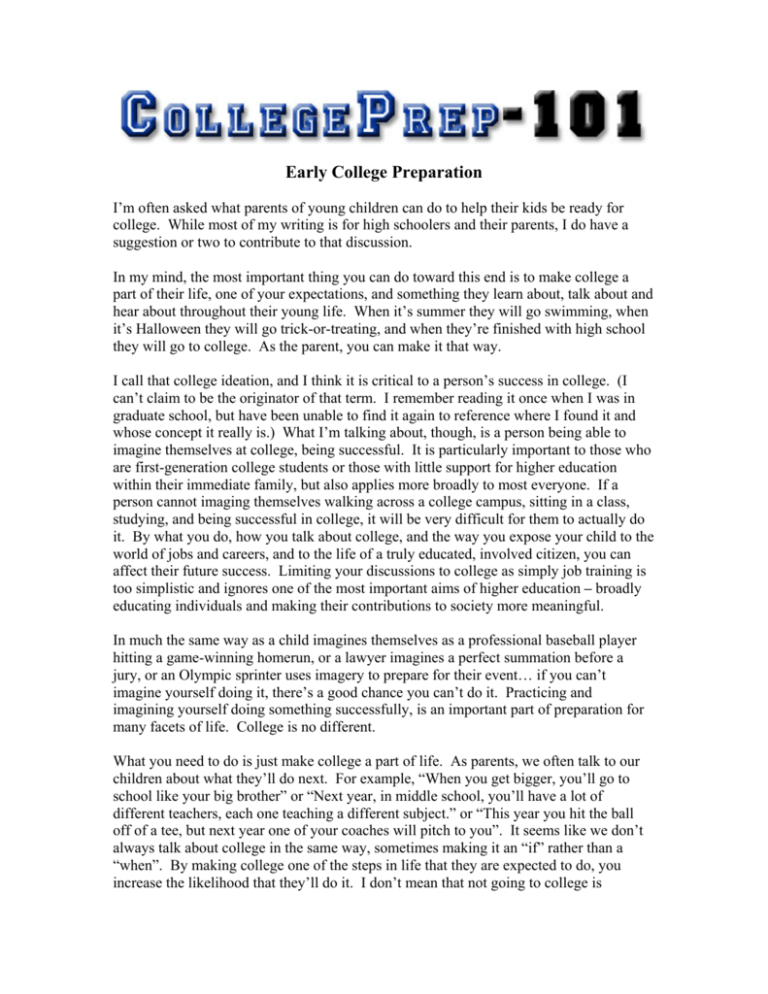
Early College Preparation
I’m often asked what parents of young children can do to help their kids be ready for
college. While most of my writing is for high schoolers and their parents, I do have a
suggestion or two to contribute to that discussion.
In my mind, the most important thing you can do toward this end is to make college a
part of their life, one of your expectations, and something they learn about, talk about and
hear about throughout their young life. When it’s summer they will go swimming, when
it’s Halloween they will go trick-or-treating, and when they’re finished with high school
they will go to college. As the parent, you can make it that way.
I call that college ideation, and I think it is critical to a person’s success in college. (I
can’t claim to be the originator of that term. I remember reading it once when I was in
graduate school, but have been unable to find it again to reference where I found it and
whose concept it really is.) What I’m talking about, though, is a person being able to
imagine themselves at college, being successful. It is particularly important to those who
are first-generation college students or those with little support for higher education
within their immediate family, but also applies more broadly to most everyone. If a
person cannot imaging themselves walking across a college campus, sitting in a class,
studying, and being successful in college, it will be very difficult for them to actually do
it. By what you do, how you talk about college, and the way you expose your child to the
world of jobs and careers, and to the life of a truly educated, involved citizen, you can
affect their future success. Limiting your discussions to college as simply job training is
too simplistic and ignores one of the most important aims of higher education – broadly
educating individuals and making their contributions to society more meaningful.
In much the same way as a child imagines themselves as a professional baseball player
hitting a game-winning homerun, or a lawyer imagines a perfect summation before a
jury, or an Olympic sprinter uses imagery to prepare for their event… if you can’t
imagine yourself doing it, there’s a good chance you can’t do it. Practicing and
imagining yourself doing something successfully, is an important part of preparation for
many facets of life. College is no different.
What you need to do is just make college a part of life. As parents, we often talk to our
children about what they’ll do next. For example, “When you get bigger, you’ll go to
school like your big brother” or “Next year, in middle school, you’ll have a lot of
different teachers, each one teaching a different subject.” or “This year you hit the ball
off of a tee, but next year one of your coaches will pitch to you”. It seems like we don’t
always talk about college in the same way, sometimes making it an “if” rather than a
“when”. By making college one of the steps in life that they are expected to do, you
increase the likelihood that they’ll do it. I don’t mean that not going to college is
unacceptable, or that it is the only path to success in life. But I do think it’s a part of
having high standards and expectations for your child and their future.
How do you do it, you ask? Here are a few ideas:
• Talk about college regularly. Relate it to jobs, careers, school, sports, your life
and the lives of other adults in your child’s life, etc.
• Start one, and regularly talk about your child’s college savings account. Stress
that it’s important enough that every month you are setting aside money for them
to go to college. Show them the statement and explain how the numbers get
bigger, and that the envelope is addressed to them, when they’re still young. Use
it as a lesson in economics, interest rates or the stock market when they get older
and can understand it. So as not to diminish anyone they know who doesn’t have
one, you should be careful how you discuss their account with them, but I think it
is an incredibly powerful statement about their worth and how you view their
future. Your child will become aware of the fact that not everyone has a college
account, and as long as they’re not throwing it in others’ faces, that knowledge
can be a good thing and contribute to their self-esteem.
• Ask them what they want to do when they grow up and relate that job or career to
what they could study in college to do it. Talk about jobs and careers as you
interact with them in daily life. When you go to the grocery store, you could talk
about managing a grocery store or a farmer raising the produce or creating the
advertisements you see on television; if you are shopping for a new home, you
could talk about building houses, or being a realtor or an architect; driving in the
car, you could talk about designing cars, building bridges or cleaning up the trash
in the world by becoming an environmental scientist. Young children may not
think past the checker or bagger they see at the grocery store, and may need a
little more explanation to understand how other people and jobs fit into the
picture. It’s probably not a bad idea, once they get a little older, to clarify the
difference between a job and a career also.
• Go to sporting events (yes, sports!) or cultural and educational activities on
college campuses – both nearby and your alma mater. Plan to spend some extra
time just wandering around campus while you’re there, especially when students
are around. Walk through buildings and the library, sit in a classroom, etc. This
gives your child a visual image to place themselves into, that will go with their
ideas about college in their future.
Outside the concept of college ideation, I think there are a couple of other things I would
suggest that would contribute to your child’s success in and likelihood of attending
college.
1. Put your child in an educational setting as early as you are able. I am
making an important distinction here between an educational setting and
simply daycare. Whether it’s a Montessori school, public PreKindergarten, or just quality child care, and whether they are learning
songs, counting, the alphabet, the planets, or whatever, they will be
sponges for knowledge. Make sure to give them lots of things to learn –
both at home and in “school”. This will start a lifelong involvement with
learning, and make them ready for the next step (in whatever they are
learning) more quickly.
2. Work with your child on their homework and do all the activities her or
his teacher gives as additional activities you could do or web sites you
could visit. As it is with about everything else, the kids who do the extra
things (like extra homework, etc.), are the ones that are ahead of their
peers. I don’t mean to set up a “my kid’s better than yours…” situation,
but later on, when it’s college admission or scholarship time, you’ll
definitely want your child to stand out above their peers. That work has to
start early, and your involvement in it will only emphasize it’s importance
and strengthen your relationship with your child.
Copyright 2007 Lance A. Millis
All Rights Reserved
www.collegeprep101.com



